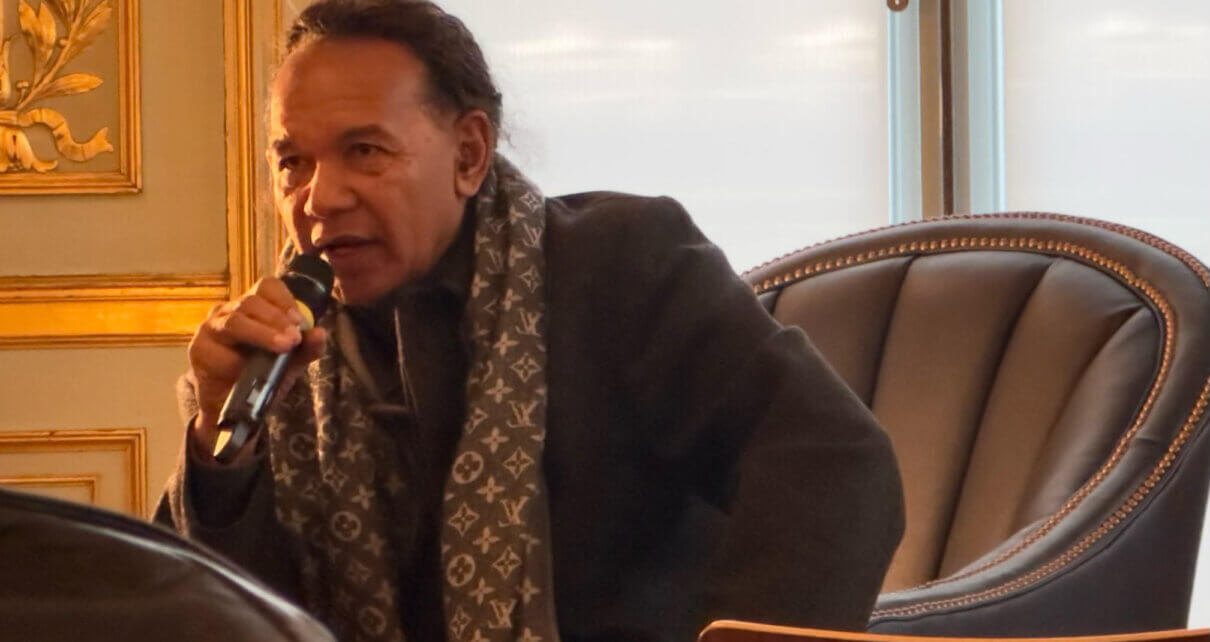Brazilian poet Salgado Maranhão and translator Alexis (pron. Alexie) Levitin came to The Great Hall for a bilingual poetry reading in Portuguese and English on Wednesday, March 29. Co-hosted by the Department of English, Intercultural Center, Institute for Global Understanding, and Department of World Languages as part of the Climate Crisis Teach-In series, the event was attended by over 20 audience members. The readings traversed through stories of Maranhão’s home and poverty through the respite of language.
Mihaela Moscaliuc, Ph.D., Associate Professor and Graduate Program Director for the Department of English, prefaced the event, “The kind of happening for which we’re gathered here tonight, a bilingual poetry reading, doesn’t happen sufficiently in our nationally diverse but strangely insular culture. Through Salgado’s work, which is in Brazilian Portuguese, we will get a chance to meet another culture on its own terms, in its own language… To access its poetry, its soul, and its history through the particulars of its music and its cadences. And, you will also hear the poems recreated in English, in Levitin’s exquisite translation.”
She continued with brief biographies of both Maranhão and Levitin. She began, “Salgado Maranhão, one of the most prominent contemporary Afro-Brazilian poets, was born in the impoverished interior of Maranhão of Northeast Brazil, and brought up by his mother, a sharecropper. The area had no schools, hospitals, or churches, and Salgado did not learn to read until he moved at the age of 15 to the city of Teresina.” These humble beginnings are the foundation to Maranhão’s poetry.
Later in the evening, Maranhão described the influence his move to the city had on his poetry journey. “The first thing I noticed when coming to the city was loneliness,” he said. “Back in the sticks where I came from… you paid attention to anyone whose path you crossed. It was an event. In the city where everybody is coming and going, and everyone is rushing about they didn’t even notice I was there. I felt like nobody. That sense of isolation pushed me towards poetry.”
The readings included excerpts from Consecration of the Wolves, the most recent bilingual collection of Salgado’s work. As Moscaliuc explained, “Consecration of the Wolves explores what it means to belong to a civilization that continues to bring destruction upon itself. These poems invite us to see the divine within the natural world, honor the sacred of its wolves, but also fend off the wolves: the beasts of greed, avarice, and power… They ask us to consider and ask ourselves, how do we want to inhabit this world, and which wolf will we feed?”
Maranhão has published 14 published collections of poetry, written lyrics for over 500 popular songs, received numerous awards and accolades, and maintains several working relationships with musicians, poets, writers, and artists. He was asked by The New York Times to author a poem about the wildfires which devastated the Amazon Rainforest in 2020; subsequently, they published his “The Old Indian” in October 2020.
Following her briefing of Maranhão’s background, Moscaliuc introduced Levitin, “He has translated 48 books, most of them by poets from Portugal, Brazil, and Ecuador.”
She likewise underscored the role of translators by quoting Milan Kundera, “Without translators, Europe would not exist; translators are more important than members of the European parliament,” said Moscaliuc. “Without Alexis, our cultural landscape would be way more impoverished than it is.”
Maranhão and Levitin concluded the formally scheduled portion of the event fielding questions from the audience, who were interested in their respective crafts of writing and translating poetry. One audience member asked, “Your poems are written in Portuguese, which is the language of your oppressors, so I’m wondering—does an ancestral language exist, and if so, have you examined it at all?”
Maranhão answered succinctly, “I’ve had contact of course with people who speak those languages… but I have not studied those languages. But, unlike the United States, in Brazil, cults and superstitions and belief systems from Africa have interwoven themselves into the overall society, so that in fact, it is much more part of Brazilian life.”
Tony Clark, MFA graduate student asked, “In addition to your experiences that you draw from to author your poetry, what artists, or other poets, or playwrights, artists of any sort, inspire you?”
Maranhão replied, “I was influenced in a very primary way, early in life, by the repentistas, these traveling troubadours, these relatively poor people, who would go village to village reciting the news or making up stories based on the news and events from the previous village, and turning it into heavily rhymed, heavily cadenced poetry, folk poetry.”
The evening concluded with Maranhão and Levitin mingling with the audience, fielding lingering questions, taking photos with students, and signing copies of Maranhão poetry collections.
Jake Garbe, a senior communication student, remarked, “[I am in awe] of the way Alexis was able to retain the weaving rhythm of Salgado’s words in his translations.”
“These events bring a lot of refreshing energy to campus,” Clark added.



